Catholic

I’m known for holding an alternative view on salvation than many Christians – even Disciples — maintain, in that I do not adhere to the doctrine that Jesus died for our sins. I know there are lots of scriptures to back this position, and one can also use scripture to justify other explanations for Jesus’ death. As many of us have seen, the Bible can be, and has been, used to justify nearly any position we care to use it to support. As for me, I’ve done years of searching, praying, discussing, and reading, and my conclusion is that it is the love of God as manifest by Jesus that is redemptive, and not Jesus’ blood.
I know some folks will likely stop here, discrediting anything else I have to say because of this perspective, which is unfortunate, but which I also understand. But a family member recently asked me about my take on communion if, in fact, I don’t ascribe to the idea that Jesus was saying “this is my body broken and my blood poured out for the remission of your sins.”
CNN reports:
Emboldened by the re-election of President Barack Obama, a cadre of liberal Catholic activists and groups is waging a campaign alleging that America's Catholic bishops are out of touch with Catholic laypeople.
The Catholic bishops, who are in Baltimore this week for a quarterly meeting, spoke out against the Obama administration during the election cycle over what they said were White House violations of religious freedom.
Some bishops also spoke out against legalized gay marriage and abortion rights, positions embraced by many Republicans.
A Sunday opinion piece in the National Catholic Reporter by Thomas Reese, a Jesuit priest at Georgetown University, hammered the bishops for their public proclamations during the campaign, saying the church leaders' “political strategy … is not working.”
Read more here:
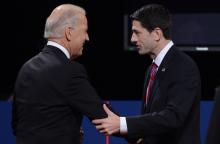
Catholicism’s social justice teachings have often been called the church’s “best-kept secret,” and after the Oct. 11 vice-presidential debate between Joe Biden and Paul Ryan – the first such showdown between the first two Catholics to oppose each other on a national ticket – that may still be the case.
While moderator Martha Raddatz earned kudos for her performance, her only question about the candidates’ shared Catholic faith came near the end of the 90-minute debate, and she framed it solely as a question of how their faith affects their policies on abortion rights.
That was seen as a victory for Catholic conservatives and Republicans who want to reinforce the image of the church as a “single-issue” religion – that issue being abortion – and a setback for liberal Democrats and others who have struggled to highlight the church’s teachings on the common good as central to Catholicism’s witness in the public square.
“What a lost opportunity!” wrote Michael O’Loughlin at the blog of America magazine, a national Jesuit weekly. “If the moderator planned to discuss faith, and I’m glad she did, why limit the discussion to one issue, however important, when the full spectrum of Catholic social teaching is ripe for an expansive and thought provoking conversation?”
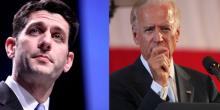
When Joe Biden and Paul Ryan face off in the vice-presidential debate Thursday night, it will mark the first showdown of its kind between the first Catholics ever to oppose each other on the major party tickets.
A “Catholic Thrilla in Manila” as a Washington Post headline put it, recalling the famous 1975 Ali-Frazier heavyweight bout in the Philippines. Store window signs in the host city of Danville, Ky., prefer the “Thrill in the Ville.”
Whatever it is called, expectations among Catholics are as high as the stakes for both campaigns.
Joseph Cella, who leads Catholic outreach for the Romney-Ryan campaign in Michigan, where the GOP ticket has nearly closed a 10-point gap, said the campaign is organizing debate-watching parties nationwide.
“I don¹t see how Vice President Biden and Congressman Ryan could avoid discussing principles of importance to Catholics,” said Cella, a veteran conservative activist.
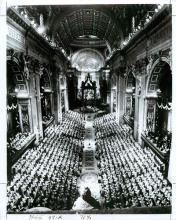
Fifty years ago hundreds of elaborately robed leaders strode into St. Peter's Basilica in a massive display of solemn ecclesiastical pomp. It signaled the start of a historic three-year assembly that would change the way members of the world’s largest Christian denomination viewed themselves, their church and the rest of the world.
It was the first day of the Second Vatican Council, more popularly known as Vatican II, which was designed to assess the church’s role in a rapidly changing world. Leading the prelates was Pope John XXIII, who said frequently that he convened the council because he thought it was time to open the windows and let in some fresh air.
For many Catholics, the air came in at gale force.
As a result of Vatican II, priests started celebrating Mass in the language of the countries in which they lived, and they faced the congregation, not only to be heard and seen but also to signal to worshippers that they were being included because they were a vital component of the service.
“It called for people not to have passive participation but active participation,” said New Orleans Archbishop Gregory Aymond, who chairs the Committee on Divine Worship for the U.S. Conference of Catholic Bishops. “Prayer is not supposed to be a performance. We’re supposed to be actively participating.”
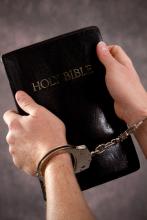
TORONTO — The Canadian government is canceling the contracts of all non-Christian chaplains at federal prisons.
By next spring, Muslim, Jewish, Sikh and other non-Christian inmates will be expected to turn to Christian prison chaplains for religious counsel and guidance.
In an email to reporters on Oct. 4, the office of Public Safety Minister Vic Toews, who is responsible for Canada's federal penitentiaries, said the government "strongly supports the freedom of religion for all Canadians, including prisoners."

I’m Catholic. My father comes from a working class Irish Catholic family; my mom is from a large Catholic family of German and Lithuanian decent. My brothers, sister, and I all attended Catholic school and growing up we attended Friday fish fries during Lent and church polka fests in the summer. I’m an active member of a Catholic church in St. Paul. And soon, my wife and I will celebrate the baptism of our daughter into the Catholic Church.
I’m also voting no on the anti-marriage and voter restriction amendments.
Some have asked how I can embrace a faith whose leadership has taken such a hard line against gay and lesbian equality, and which is painfully quiet on the threat to limit voting rights. I understand why people ask this question. For me, my decision to vote no is not in spite of my Catholic faith, it’s because of it.
When I was 10 my parents divorced. A couple years later my mom came out to my family as lesbian. By then she no longer felt welcome at church and stopped going to mass, though she has remained a deeply spiritual person. This one case of social exclusion is deeply meaningful to me, but is nothing compared to political decision by church leadership to spend millions of dollars to limit the freedom to marry in Minnesota. By doing so church leaders seek to permanently exclude gays and lesbians from the civil rights and benefits straight couples enjoy.
But here’s the thing: I’m still getting my daughter baptized. And I’m still Catholic. And I’m still voting no on both amendments in November.

An Illinois priest who was forced out of his parish by his bishop for improvising prayers during Mass has had his suspension reversed by the Vatican.
The Vatican decided in favor of the Rev. William Rowe on one of three counts, saying Bishop Edward Braxton of Belleville, Ill., had not followed the proper procedure.
The Vatican's reversal means he can celebrate Mass in another diocese, Rowe said, as long as he has the local bishop's approval. Others, however, disputed that interpretation of the decree.
In a letter that accompanied the document, Monsignor Antonio Neri, an undersecretary of the Vatican's Congregation for the Clergy, said Rowe could only return to celebrating Mass “when you shall have acknowledged your error and formally promise to dispose yourself to adhere to the rights and rubrics of the sacred liturgy set down by the lawful ecclesiastical authorities.”
The Vatican sided with the bishop on two counts: upholding his removal from the parish, and agreeing with the bishop's withdrawal of the priest's "faculties" — or his license to practice ministry under church law.
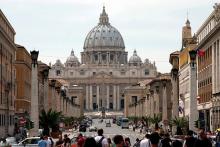
Just one week after Pope Benedict XVI ended his successful visit to Lebanon, the country's most senior Catholic leader called for a United Nations resolution “that will ban denigrating religions.”
Meanwhile in Pakistan, the country's only Catholic cabinet member, Minister of Harmony Paul Bhatti, this week told an interfaith gathering in Lahore that he will press U.N. Secretary General Ban Ki Moon to pass a UN resolution that condemns "defamation and contempt against religions." Bhatti said "we must not allow anyone to break our harmony" between Christians and Muslims.
Both moves are understandable in light of increasingly popular efforts in predominantly Muslim countries to outlaw blasphemy or defaming religion. But they could prove problematic for the Vatican as it fights to protect the rights of Christian minorities around the world.
The debate suggests a widening gap between the Vatican's official position, which opposes such measures, and the day-to-day reality of Catholic leaders on the ground, who often feel compelled to support Muslim efforts to protect religious tenets and religious figures from defamation.
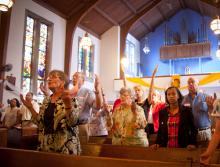
President Obama’s support among Catholic voters has surged since June, according to a new poll, despite a summer that included the Catholic bishops’ religious freedom campaign and the naming of Rep. Paul Ryan, a Catholic, as the GOP's vice-presidential candidate.
On June 17, Obama held a slight edge over Mitt Romney among Catholics (49-47 percent), according to the Pew Research Center. Since then, Obama has surged ahead, and now leads 54-39 percent, according to a Pew poll conducted on Sept. 16.
Among all registered voters, Obama leads Romney 51-42 percent, according to Pew.
Obama and Romney are essentially tied among white Catholics, which some pollsters call the ultimate swing group.
On Sept. 24 Romney unveiled his Catholics for Romney Coalition, which includes numerous politicians, beer magnate Pete Coors and Princeton University intellectual Robert P. George. The Obama campaign also has a Catholic coalition.

NEW ORLEANS — Faith-based ministries and local charities that are ramping up relief efforts after Hurricane Isaac say it's already clear that recovery will proceed without the national outpouring of money and volunteers triggered by Hurricane Katrina.
"From our point of view, the biggest challenge with this disaster will be getting attention and money," said Gordon Wadge, president of the New Orleans chapter of Catholic Charities.
"This is going to be on the local community — with a few national folks who follow us closely and who will rally to us."
That's a stark contrast to the conditions relief directors saw in 2005, after nationally televised images of human misery from Katrina burned themselves into the national psyche. Within weeks, faith-based ministries and secular relief groups promised to funnel millions of dollars into New Orleans over five years.
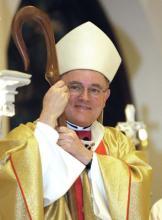
A series of recent developments are renewing questions about the Catholic bishops' alignment with the Republican Party, with much of the attention focusing on comments by Philadelphia Archbishop Charles Chaput, who said he “certainly can’t vote for somebody who’s either pro-choice or pro-abortion.”
In a wide-ranging interview published Sept. 14, Chaput also echoed the views of a number of prominent bishops when he praised Republican vice presidential nominee Paul Ryan for trying to address the “immoral” practice of deficit spending through his libertarian-inflected budget proposals.
"Jesus tells us very clearly that if we don’t help the poor, we’re going to go to hell. Period. There’s just no doubt about it,” Chaput told National Catholic Reporter.
“But Jesus didn’t say the government has to take care of them, or that we have to pay taxes to take care of them. Those are prudential judgments. Anybody who would condemn someone because of their position on taxes is making a leap that I can’t make as a Catholic.”
Chaput stressed that he is a registered independent “because I don’t think the church should be identified with one party or another.” But he said that the Democratic Party’s positions on abortion rights, gay rights, and religious freedom “cause me a great deal of uneasiness.”
He added that economic issues are “prudential judgments” open to a variety of legitimate approaches. Abortion, on the other hand, is “intrinsically evil” and must always be opposed.
That is a talking point voiced by many Catholic conservatives, including Ryan himself. Last Friday, Ryan told the Christian Broadcasting Network that opposition to abortion and same-sex marriage, and support for religious freedom, are all “non-negotiables” for a Catholic politician while “on other issues, of economics and such like that, that’s a matter of prudential judgment.”

As baby boomers start clicking the senior citizen box on travel fares, I want to say a word to my generation and to the one that preceded us.
It is time for us to get out of the way.
I don't mean easing into wheelchairs. For the most part, we're way too healthy and energetic for that. I mean the harder work of relinquishing control.
I see that need most clearly in religious institutions, where I work. But I see it elsewhere, too, from taxpayer "revolts" led by seniors against today's schoolchildren to culture wars that we won't let die.
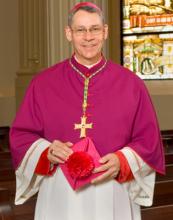
Finn, leader of the Diocese of Kansas City-St. Joseph and an outspoken conservative in the American hierarchy, was convicted of a single misdemeanor count for not telling police that one of his priests, the Rev. Shawn Ratigan, had taken hundreds of lewd images of children in Catholic schools and parishes.
But even as he became the first U.S. bishop ever convicted in criminal court for shielding an abusive priest, Finn’s standing inside the church appears uncertain, and the subject of intense debate.
Should he stay or should he go? Finn has indicated that he wants to tough it out.

As the Republicans leave Tampa and the Democrats prepare to gather in Charlotte, one dynamic is immediately clear in both parties: For the first time since Abraham Lincoln ran in 1860, no white Protestant will be on the ticket of either major party.
Mitt Romney, the newly minted Republican nominee for the White House, is a Mormon, though he clearly does not want to talk publicly about how his faith shapes his identity and personal values. Paul Ryan, his running mate, is a Catholic, a fact Romney made sure to mention in the vice presidential rollout ceremony. Indeed, Romney’s two closest rivals in the GOP presidential primaries were also Catholics: Newt Gingrich and Rick Santorum.
On the Democratic side, President Obama is an African-American Protestant despite the fetid conspiratorial screams that the president is a crypto-Muslim. Finally, Vice President Joe Biden, like Ryan, is an Irish-American Catholic.
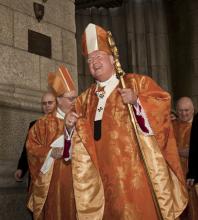
NEW YORK — Cardinal Timothy Dolan, who sparked controversy by agreeing to deliver the closing blessing at the Republican convention in Tampa this week, on Monday drew further attention to his political role by asking both Mitt Romney and Barack Obama to sign a “civility pledge” promoted by a leading conservative Catholic activist.
The archbishop of New York wrote to Romney and Obama, as well as their running mates, Paul Ryan and Joe Biden, asking them to sign the “Civility in America” pledge developed by Carl Anderson, head of the powerful Knights of Columbus and a man with long-standing ties to the Republican Party.

In what is being described as the first of its kind in the U.S., the Archdiocese of New Orleans has transformed a vacant church rectory into a group house where single women will live together while deciding whether to undertake lives as nuns.
The center, dedicated on Aug. 15, occupies the second and third floors of the St. Rita rectory. Within a few days, two women, then perhaps three more, will move into the spotless rectory, their collective lives to be superintended by two veteran nuns who will show the younger women the dynamics of shared community life.
“How we live in community. How to communicate. How to share,” said Sister Carmen Bertrand, for 48 years a member of the Sisters of the Holy Family.
Beyond orienting them to the rhythms of community life, Bertrand and her colleague, Sister Diane Roche, a Religious of the Sacred Heart, will teach the tenants various modes of prayer, organize occasional retreats, and bring in representatives of other religious orders to present themselves and their ways of life.
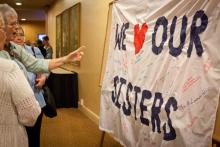
A leader of the group of Catholic nuns who are facing a crackdown from the Vatican said on Thursday that her members have no plans or desire to leave the church, or reconstitute their group beyond Vatican control.
Sister Mary Hughes, who ended a three-year term as president of the Leadership Conference of Women Religious on Aug. 11, said there is little-to-no support to withdraw the LCWR from the church, where it could avoid a Vatican-order makeover.
"It is the deep desire of the membership to stay within the church and not move away from it," Hughes said at a luncheon at the National Press Club. "We derive our strength from the sacramental life of the church."

The 2012 presidential campaign could bear a new subtitle: A Tale of Two Catholics.
For the first time in U.S. history, both sides of the ballot include Roman Catholics: Democrats’ Vice President Joe Biden, and Republicans' newly named vice presidential candidate Paul Ryan.
Ryan, 42, still belongs to the Catholic parish, St. John Vianney in Janesville, Wis., where he was an altar boy. Biden, 69, the first Catholic vice president in U.S. history, attends Mass at St. Patrick’s Parish and St. Joseph on the Brandywine Church, both in Wilmington, De.
Biden and Ryan both cite their faith as a formative influence, but neither is known as a standard-bearer for the Catholic hierarchy’s chief political causes: abortion and gay marriage. In fact, the two candidates are — politically at least — nearly polar opposites.
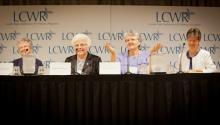
American nuns facing a Vatican takeover of their leadership organization on Aug. 10 rejected Rome’s plans to recast the group in a more conservative mold, but declined — for now — to respond with an ultimatum that could have created an unprecedented schism between the sisters and the hierarchy.
Instead, the nuns said they wanted to pursue a negotiated solution to the showdown that has galvanized American Catholics in recent months and prompted an outpouring of support for the sisters that left the Vatican with a black eye.
The statement from the Leadership Conference of Women Religious came at the end of the LCWR’s annual assembly here and was the first formal response to the Vatican from the entire organization, which represents most of the 56,000 nuns in the U.S.
The Vatican announced in April that it was assigning a team of bishops to take control of the LCWR in order to make the organization — and by extension, most U.S. nuns — hew more closely and publicly to orthodox teachings on sexuality and theology.
Sister Pat Farrell, the outgoing president of the LCWR, on Friday read the official response that expressed the organization’s “deep disappointment” with Rome’s verdict. But the statement also said the nuns wanted to keep talking with the hierarchy in hopes of “creating more possibilities for the laity and, particularly for women, to have a voice in the church.”